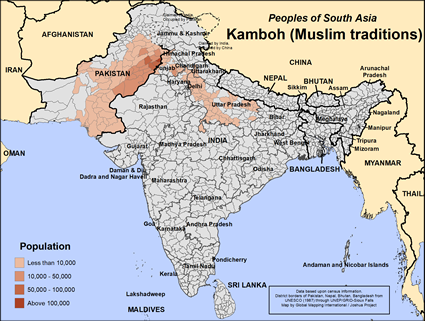Kamboh (Muslim traditions) in India

Photo Source:
Amjad Kamboh
|

Map Source:
People Group data: Omid. Map geography: UNESCO / GMI. Map Design: Joshua Project.
|
| People Name: | Kamboh (Muslim traditions) |
| Country: | India |
| 10/40 Window: | Yes |
| Population: | 31,000 |
| World Population: | 1,027,000 |
| Primary Language: | Punjabi, Eastern |
| Primary Religion: | Islam |
| Christian Adherents: | 0.00 % |
| Evangelicals: | 0.00 % |
| Scripture: | Complete Bible |
| Ministry Resources: | Yes |
| Jesus Film: | Yes |
| Audio Recordings: | Yes |
| People Cluster: | South Asia Muslim - other |
| Affinity Bloc: | South Asian Peoples |
| Progress Level: |
|
Introduction / History
Centuries ago, the Kamboh people migrated east from what is now Iran into the Indian subcontinent. As time went on, many of them became government officials, though many settled down as farmers. "For sheer tenacity and persistence, nobody can beat the Kambohs," stated M.S. Randhawa, the former Vice Chancellor of Punjab University. Writers have often admired the Kamboh people for their talents as agriculturalists and soldiers.
What Are Their Lives Like?
Many work on the land, in business or for the government. They are reasonably well educated and use modern medicine and family planning. On the death of the father, Kamboh sons inherit the property with the oldest son taking charge of the home. They have a caste council to look after their interests.
What Are Their Beliefs?
Though the Kamboh have diverse beliefs, many are Sunni Muslim, especially in Pakistan. A smaller number of Kamboh Muslims are in India.
Sunnis believe that the supreme God, Allah, spoke through his prophet, Mohammed, and taught mankind how to live a righteous life through the Koran and the Hadith. To live a righteous life, you must utter the Shahada (a statement of faith), pray five times a day facing Mecca, fast from sunup to sundown during the month of Ramadan, give alms to the poor, and make a pilgrimage to Mecca if you have the means. Muslims are prohibited from drinking alcohol, eating pork, gambling, stealing, slandering, and making idols. They gather for corporate prayer on Friday afternoons at a mosque, their place of worship.
The two main holidays for Sunni Muslims are Eid al Fitr, the breaking of the monthly fast and Eid al Adha, the celebration of Abraham's willingness to sacrifice his son to Allah.
Sunni religious practices are staid and simple. They believe that Allah has pre-determined our fates; they minimize free will.
In most of the Muslim world, people depend on the spirit world for their daily needs since they regard Allah as too distant. Allah may determine their eternal salvation, but the spirits determine how well we live in our daily lives. For that reason, they must appease the spirits. They often use charms and amulets to help them with spiritual forces.
What Are Their Needs?
You can say that they are one of India's most religiously diverse people groups, as well as one of her most competent. Yet as a people, they have not found it in their hearts to submit to the one who yearns to have them become part of His Kingdom. They have remained part of several religions, but few if any have given Jesus a chance to change their lives.
Prayer Points
Pray for a movement of Jesus to heal and strengthen Muslim Kamboh communities.
Pray for a "Book of Acts" type of movement to Christ among the Muslim Kamboh.
Pray for the Muslim Kamboh people to understand and embrace that Jesus wants to bless their families and neighborhoods.
Pray for Holy Spirit anointed believers from the Muslim Kamboh people to change their society from within.
Pray for a movement in which the Holy Spirit leads and empowers disciples to make more disciples.